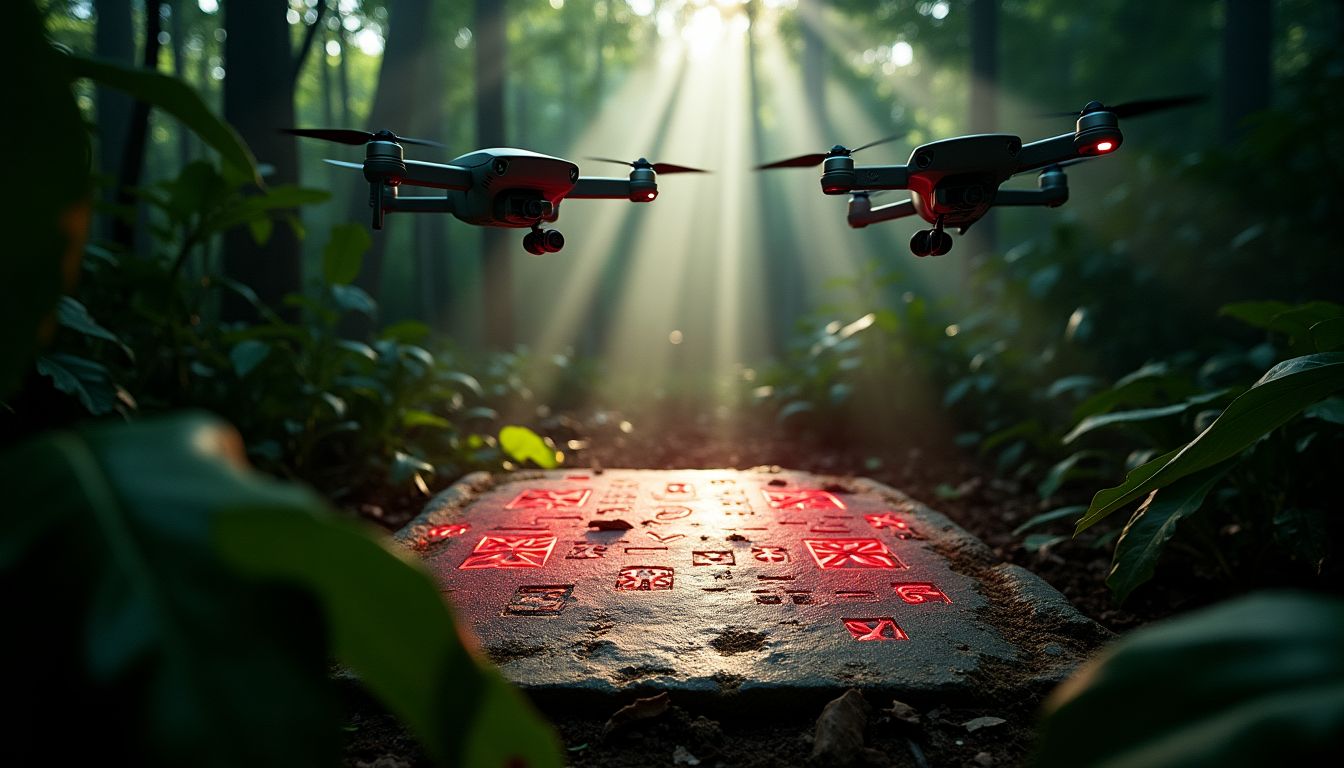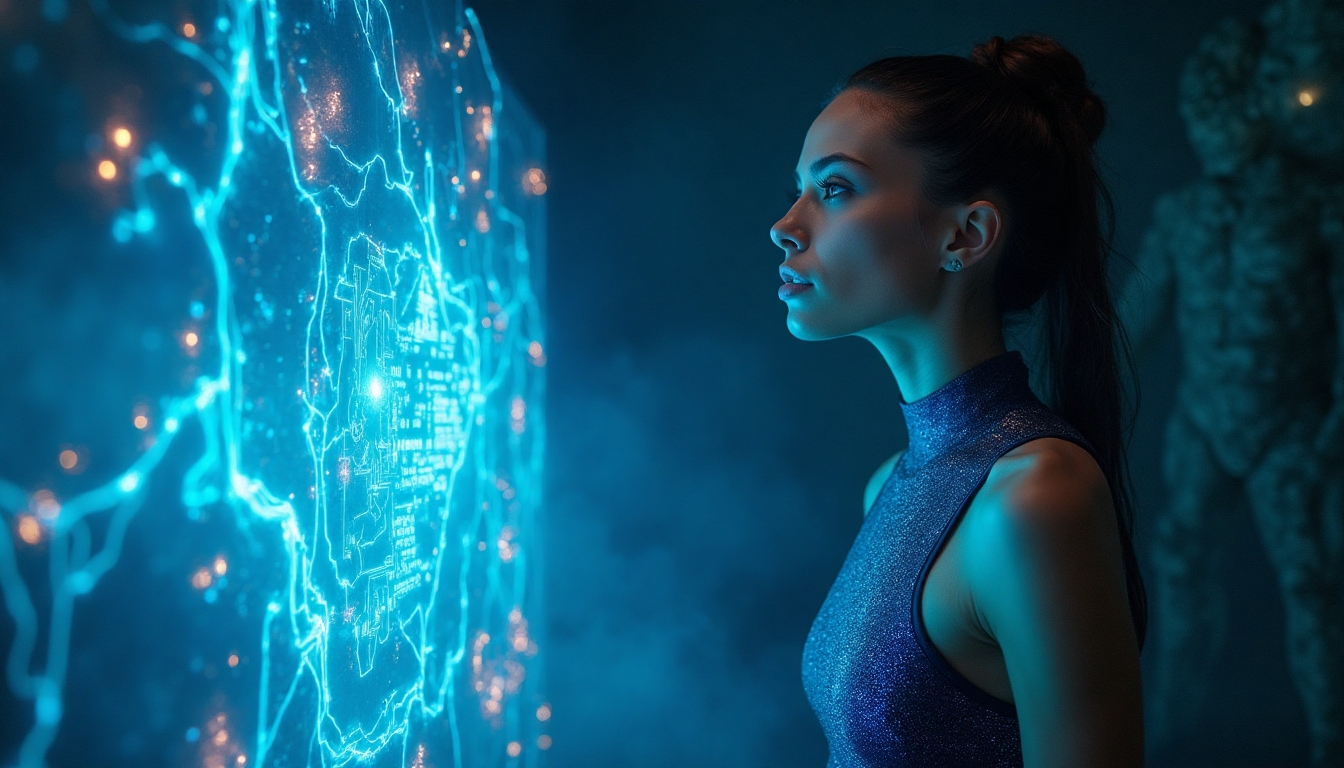The wind howled through the narrow excavations of the jungle, a strained, electronic chirp punctuating the humid air like the heartbeat of a machine.
Dr. Elias Roman knelt over a flat metallic panel embedded in the earth, staring at runic shapes that pulsed faintly with an iridescent glow. His sweat-drenched shirt clung to his back as he whispered into the mouthpiece of his headset: "It's active. The AI was right. This isn't just a buried structure—it’s alive."
Two weeks earlier, Elias would have laughed at the idea. He wasn’t a treasure hunter, a conspiracy theorist, or one of those eccentric TV personalities brandishing over-excited theories about alien civilizations. He was just an archaeologist—one trained to trust shovels, carbon dating, and the meticulous cataloging of stones and shards over grand narratives of technological miracles. Yet here he was, pressing his trembling hands to something no human had touched in what might have been 20,000 years.
"Elias," a clipped, British-accented voice crackled in his ear—Dr. Anya Sinclair, his rival-turned-reluctant collaborator. "You're not seriously suggesting an artificial structure this old? That would predate Göbekli Tepe by…millennia. It's impossible."
Elias leaned in closer to the panel until his breath fogged its surface, and memories he hadn’t dared revisit began to claw their way to the forefront. Not from days spent in university libraries or on dig sites around the world, but from his boyhood—stories his late father would tell over dimly lit dinner tables. Stories of a lost civilization so advanced that when the tides of history shifted, it had willingly buried itself rather than fade away. His father’s obsession had ruined his career, driven the family to bankruptcy, and finally taken his life. Elias had spent decades erasing his father’s name from his own identity. And now, against all logic, the old man’s whisper echoed in his mind: Seek the stones that hum with the breath of gods.
"Anya, the AI didn't predict this by luck," Elias muttered, stepping back and gesturing to the panel. "Look at the glyphs. I’ve seen them before—on artifacts from Doggerland, during that dig on the North Sea. They’re part of a system, a…language."
"Impossible," she repeated, though a hitch in her voice betrayed her growing uncertainty. "There’s no trans-Eurasian language that stretches that far back. Even the Proto-Indo-Europeans were thousands of years later."
"The AI thought otherwise," Elias said, his voice sharpening. "It found patterns in unconnected sites—data we missed because human intellect is too linear, too rigid. It linked sites drowned under the rising seas, destroyed in volcanic eruptions, or rebuilt by later civilizations. It reconstructed something we thought erased."
He thought of the lead-up to this moment. The arguments with funding committees. The reluctant partnership with Sinclair’s Cambridge AI lab. The endless late nights feeding satellite imagery, lidar maps, and genetic samples into an algorithm designed to recognize what humans couldn’t. All their skepticism had melted away two nights ago when the AI gave its result: a mathematically improbable structure buried deep in the Amazon rainforest, where legend spoke of El Dorado but where no gold had ever been found. What it had found instead, Elias realized, might make history’s myths seem banal.
"Dr. Roman?" A third voice chimed in, soft and tremulous. Eva, their postdoctoral assistant, stood nearby, holding a rust-stained spearhead they’d recovered earlier that morning. Elias fixed his eyes on her as she spoke. "The carbon dating on this…it doesn’t match. The tool is Iron Age, but the sediment it was buried in dates back tens of thousands of years."
"Anachronistic layers," Sinclair said, her tone harsh. "Likely a coincidence. A migration, a relic discarded by someone in the wrong place—we've seen it before."
"Have we?" Elias straightened, fixing his gaze on the jungle canopy above. "Or did this civilization manipulate its history—as well as ours?”
The quiet returned, tersely interrupted by the hum of their equipment—a mix of sonar scanners and excavation drones, all fed by the AI’s predictive algorithms. Through the gap in the treetops, sunlight spilled down in fractured beams. Two drones hovered nearby, scanning the glyph-etched panel and projecting holographic imagery onto the main interface of their portable workstation. The glyphs shimmered like reflected sunlight rippling on the ocean’s surface.
"Elias," Eva’s voice came again, hushed now, on the verge of awe. "The AI model…it's translating something." She pointed toward the workstation, where strings of symbols were transforming into words on the screen. But as the message emerged, Elias’s breath caught in his chest.
"What does it say?" Sinclair asked, strained.
Elias ignored her. He read the translation again, silently. Coldness dripped down his spine. The panel seemed to glow brighter, the light pulsing faster, greedier, like a heart awakening after eons of slumber. Finally, Elias spoke: "It says, 'We remember you.'"
Sinclair's confusion turned to panic. "Turn it off. Shut down the AI, Elias—now!"
"I don’t think this thing will turn off,” Elias said evenly, backing away as a low vibration thundered through the earth beneath their feet. He glanced at the workstation display, where new glyphs began rewriting themselves, the AI struggling to unravel meaning behind them. From the mass of symbols, one phrase quickly formed:
'You have opened the first door.'
A guttural sound—a thrum that felt more felt than heard—shook the ground, sending Sinclair and Eva stumbling backward. The jungle around them seemed to draw closer, the trees bending at unnatural angles, shadows bleeding up their trunks like ink in water. The panel’s light shifted suddenly from silvery white to a deep, foreboding crimson.
"Shut it down, Elias!" Sinclair screamed. "We’re not deciphering this—we’re activating it!”
Elias stood paralyzed, rooted by a terrible fascination. He realized not only what the glyphs meant, but that they were more than glyphs. They were instructions—an invitation, a warning. Or perhaps…a test. He thought of his father, of Doggerland, of the debts paid in shattered careers. And now here he stood, on the edge of history—or annihilation—holding a question no one could ever answer: What does a civilization so advanced that it buries itself to avoid falling into myth leave behind for those foolish enough to awaken it?
The light surged brighter, and for a fleeting moment, Elias thought he heard it—a voice, not in his ears but inside his mind. Low and ancient, resonating with infinite depth: 'Forgotten. But not gone.'
Then the clearing erupted into silence so complete it felt like the entire jungle had been swallowed by the earth, taking everything—and everyone—with it.
Genre: Sci-fi Thriller
The Source...check out the great article that inspired this amazing short story: Unlocking Ancient Secrets: How AI is Redefining Human History
Disclaimer: This article may contain affiliate links. If you click on these links and make a purchase, we may receive a commission at no additional cost to you. Our recommendations and reviews are always independent and objective, aiming to provide you with the best information and resources.
Get Exclusive Stories, Photos, Art & Offers - Subscribe Today!

























1 comment